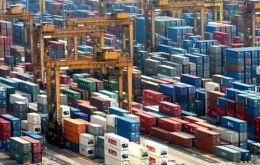MercoPress. South Atlantic News Agency
Economy
-
Tuesday, January 7th 2014 - 06:05 UTC
For second year running Uruguay manages deflation in December, keeps inflation in one digit

Uruguay again managed a December with deflation, (as happened exactly a year ago) with the consumer prices index down 0.72%, helping to bring 2013 inflation to 8.52%, according to the official stats office, INE. This is the sixth year in the last ten that Uruguay despite an unprecedented decade long growth-boom and abundant revenue overshoots its inflation target.
-
Tuesday, January 7th 2014 - 05:58 UTC
Yellen confirmed as next Federal Reserve chairperson: Senate votes 56-26

Janet Yellen, a key force behind the Federal Reserve's unprecedented and controversial efforts to boost the US economy, was confirmed on Monday by the Senate to lead the central bank just as it begins to unwind that stimulus.
-
Monday, January 6th 2014 - 19:42 UTC
Uruguayan minister says trade relations with Argentina “will never be the same”

Industry, Energy and Mining Minister, Roberto Kreimerman, said Uruguay would try to settle disputes with Argentina in order to reestablish trade relations, but he also recognized Uruguay’s relationship with Argentina 'will never be the same'. The minister revealed that 32 million dollars of Uruguayan exports are blocked at Argentine Customs.
-
Sunday, January 5th 2014 - 13:07 UTC
Falklands looks to South America and Scotland to service its oil industry development

Successful trade missions to Uruguay and Chile and the growing support and know-how links with Scotland for the development of the Falkland Islands oil and gas industry were mentioned as some of the 2013 highlights by Roger Spink, president of the Falklands Chamber of Commerce in his Christmas speech.
-
Saturday, January 4th 2014 - 04:38 UTC
Mantega releases crucial data to calm market anxiety about Brazil's accounts

Brazil's Finance Minister Guido Mantega insisted on Friday that the government is keeping spending under control as he sought to calm anxiety about the deterioration of the government's accounts. The minister said the primary budget surplus, (excess of revenue over expenditure before debt payments) would be above the goal of 73 billion Brazilian Reais for 2013 (30.5bn dollars), equivalent to about 1.5% of gross domestic product.
-
Friday, January 3rd 2014 - 23:34 UTC
Cristina Fernandez administration launches yet another price control program

Argentina's government formally launched on Friday its latest price control program as double-digit inflation sets the stage for tense annual wage talks in coming months. The one-year program sets prices on 194 supermarket items including staples like milk, meat and pasta as well as discretionary items such as beer and ice cream.
-
Friday, January 3rd 2014 - 23:15 UTC
Brazil posted its worst trade surplus since 2.000 at 2.56bn dollars

Brazil posted its lowest trade surplus in 13 years on Thursday, at 2.56 billion dollars for 2013, the trade and commerce ministry said, citing rising imports. The country's foreign trade association AEB had previously warned that 2013 could see the first full-year trade deficit since 2000, which compares with a 19,4bn dollars surplus in 2012
-
Friday, January 3rd 2014 - 18:52 UTC
Record exports in dollars for Uruguay in 2013, but prospects not so encouraging

Uruguayan exports in 2013 increased 4.8% in value and reached a record 9,155 billion dollars with soybean the main item and China the leading trade partner. The data was released by the government export promotion organization Uruguay XXI, which sometimes is over optimistic.
-
Friday, January 3rd 2014 - 18:40 UTC
'Andean super crop' quinoa opens the way for the UN Year of Family Farming

Increased production and consumption of quinoa, coupled with higher visibility of and greater scientific knowledge about the so-called “Andean super crop” is the legacy left to the world by the International Year of Quinoa 2013, the closing ceremonies of which were held in Bolivia and Peru.
-
Friday, January 3rd 2014 - 00:30 UTC
Chrysler becomes 100% Italian as FIAT buys remaining 41% stake

Shares in Italian car giant Fiat have jumped more than 15% following the announcement of its plan to buy the remaining 41% of Chrysler it does not own. Fiat has owned a majority stake in the US company since 2009.
